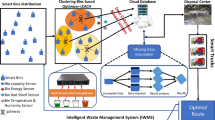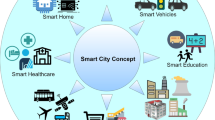Abstract
In mobile crowd-sensing, smartphone users take part in sensing and then share the data to the server (cloud) and get an incentive. These data can be utilized for providing better services to improve quality of life. Batteries used in smartphones constrain the usability of these devices for longer charge cycles. Hence, maintaining a balance between energy consumption due to crowd-sensing application and that due to the current computational load on the device is the need of the hour. Consequently, in this paper, we formulate strategies applying Markov Decision Process (MDP) by which a smart handheld would crowd-sense while keeping the device active for a longer period of time. MDP used here helps to decide when a device would lend itself to crowd-sense considering the remaining energy of the device, it’s recharging probability, current computational load,and the incentive it receives. In this work, we have considered indoor localization as an example of a smartphone based crowd sensing application. The strategies found by solving MDP formulation are implemented for a smartphone application for crowd-sensed indoor localization. We have experimented using 5 smart handheld devices for different use cases. Our scheme is found to perform better than the state-of-the-art works.









Similar content being viewed by others
References
Higuchi T, Yamaguchi H, Higashino T, Takai M (2014) A neighbor collaboration mechanism for mobile crowd sensing in opportunistic networks. IEEE International Conference on Communications (ICC), pp 42-47
Ganti R, Ye F, Lei H (2011) Mobile crowd sensing: current state and future challenges. IEEE Commun Magaz 49(11):32–39
Hassani A, Haghighi PD, Jayaraman PP, Zaslavsky A (2017) A context aware framework for mobile crowd-sensing. In: Proc of Intr and Interdisciplinary Conf on Modeling and Using Context, CONTEXT 2017: Modeling and Using Context, pp 557–568
Chowdhury C, Roy S (2017) Mobile crowdsensing for smart cities. In: Smart Cities Foundations Principles and Applications, Chapter 5, Hoboken, NJ, USA:Wiley, pp 125–154
Moamen AA, Jamali N (2015) ShareSens: an approach to optimizing energy consumption of continuous mobile sensing workloads. In: Proc of 2015 IEEE Intr Conf on Mobile Services, pp 89–96
Liu CH, Zhang B, Su X, Ma J, Wang W, Leung KK (2017) Energy-Aware participant selection for smartphone-enabled mobile crowd sensing. IEEE Systems Journal 11(3):1435–1446
Wang L, Zhang D, Yan Z, Xiong H, Xie B (2015) effSense: A novel mobile crowd-sensing framework for energy-efficient and cost-effective data uploading. IEEE Trans on Systems, Man, and Cybernetics: Systems 45 (12):1549–1563
Han K, Zhang C, Luo J (2016) Taming the uncertainty: Budget limited robust crowdsensing through online learning. IEEE/ACM Trans on Netwk 24(3):1462–1475
Wang J, Tang J, Xue G, Yang D (2017) Towards energy-efficient task scheduling on smartphones in mobile crowd sensing systems. Proc of Computer Ntwks 115:100–109
Abdelaal M, Qaid M, Dürr F., Rothermel K (2017) iSense: Energy-aware crowd-sensing framework. In: Proc of IEEE 36th Inter Performance Computing and Comms Conf(IPCCC), pp 1–9
Capponi A, Fiandrino C, Kliazovich D, Giordano S (2017) A cost effective distributed framework for data collection in cloud based mobile crowd sensing architecture. IEEE Trans on Sustainable Computing 2(1):3–16
Lane ND, Chon Y, Zhou L, Zhang Y, Li F, Kim D, Ding G, Zhao F, Cha H (2013) Piggyback crowdsensing (PCS): Energy efficient crowdsourcing of mobile sensor data by exploiting smartphone app opportunities. In: 11th ACM Conf on Embedded Netw Sensor Systems, pp 1–14
Roy P, Chowdhury C, Ghosh D, Bandyopadhyay S (2019) JUIndoorLoc: a ubiquitous framework for smartphone-based indoor localization subject to context and device heterogeneity, wireless personal communications. Springer 106(2):739–762
Tomasoni M, Capponi A, Fiandrino C, Kilazovich D, Graneli F, Boury P (2018) Profiling energy efficiency of mobile crowd sensing data collection framework for smart city applications. In: 6th IEEE Inter Conf on Proc of Mobile Cloud Computing, Services, and Engineering (MobileCloud), 2018
Wu W, Wang J, Li M, Liu K, Shan F, Luo J (2016, December) Energy-efficient transmission with data sharing in participatory sensing systems. IEEE Journal on Selected Areas in Communications 34(12):4048–4062
Liu CH, Zhang B, Su X, Ma J, Wang W, Leung KK (2011) Energy aware participant selection for smartphone-enabled mobile crowd sensing. IEEE Systems Journal 11(3):1435–1446
Xu C, Srinivasan V, Yang J, Hirase Y, Tapia EM, Zhang Y (2014) Boe: context-aware global power management for mobile devices balancing battery outage and user experience. In: 2014 IEEE 11th Inter Conf on Mobile Ad Hoc and Sensor Sys, pp 300– 308
Zhang M, Li Y, Chen H (2016) A semi-Markov decision process based dynamic power management for mobile devices, pp 249–254
Puterman ML (2014) Markov decision processes: discrete stochastic dynamic programming. Wiley, Hoboken
Volley Overview, https://developer.android.com/training/volley/. Accessed 04/06/2019
The R project for statistical computing, https://www.r-project.org/. Accessed 06-06-2019
Author information
Authors and Affiliations
Corresponding author
Additional information
Publisher’s Note
Springer Nature remains neutral with regard to jurisdictional claims in published maps and institutional affiliations.
Rights and permissions
About this article
Cite this article
Ray, A., Chowdhury, C., Mallick, S. et al. Designing Energy Efficient Strategies Using Markov Decision Process for Crowd-Sensing Applications. Mobile Netw Appl 25, 932–942 (2020). https://doi.org/10.1007/s11036-020-01522-6
Published:
Issue Date:
DOI: https://doi.org/10.1007/s11036-020-01522-6




